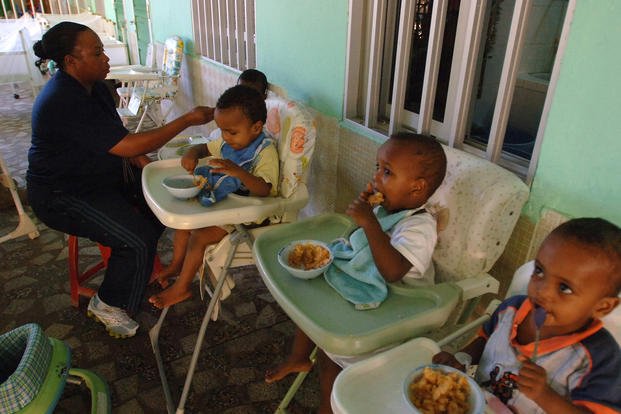Up, down, in, out and running around, toddlers like to explore and master their world, including the food they choose to eat. While not always sitting still for very long, they normally eat enough calories to grow and thrive. Our role as parents and caretakers is to ensure they are offered a variety of foods that provide the calories and nutrients their growing, busy bodies need during their early years. Toddlers need to decide what and how much they eat of the foods offered to them.
Food Jags are Common
Does your toddler want to eat only macaroni and cheese or dry cereal at dinner? It is common for toddlers to go through food jags where they want to eat the same food over and over again. Don't be too concerned if they only want to eat macaroni and cheese; you choose the foods on your child's plate. If you give them the same food regularly, try adding a different food to their plate at meals and encourage them to try it. Most food jags do not last very long, especially if parents don't accommodate them.
Tame the New Food Fears
Tried offering broccoli and your toddler did not eat it the first time? Well, don't give up after the first try. It naturally takes children up to 10 times trying a new food before they accept it. Continue to give the broccoli or any other new food at meals and snacks without forcing them to eat it. Remember to offer small portions and encourage them to try it. And be sure you're setting a good example. Serve healthy foods that you like so your child will see you enjoying what you're asking him or her to eat.
Serve Child-Size Portions
A couple of tablespoons are usually plenty to serve, especially for new foods. Small plates and small portions are just right for small eyes and stomachs, less overwhelming. Let your child decide what to eat. Don't force them to eat something if they don't want it. It's OK to have them try a bite, but let them decide how much they will eat after the first bite.
Eat Meals Together
Children need to eat with other people, especially their families. Toddlers are more likely to try new foods when they see their brothers, sisters or parents eating with them. Look for opportunities to offer healthy foods to your toddler at home and outside activities. Fruits and vegetables can be offered to a group of children as a new adventure for them to try.
Toddlers Need to Feed Themselves
Tried letting your child feed himself and spent an hour cleaning up? Toddlers need to feed themselves. While they are learning how to master this skill, they are developing critical eye and hand coordination along with self-confidence. Your child should start finger feeding around nine months and try using utensils by 15-18 months. Provide opportunities for your child and help out only when necessary. When you are feeding your toddler, try not to force in that last bite, allowing his hunger cues to guide how much he eats. Don't get into a power struggle with your child; let him have control over how much he eats and how he eats it.
Toddlers Need to Eat Often
Small stomachs and short attention spans lead to toddlers needing to eat five to six times a day. Children need and like structure in their lives, so scheduled meals and snacks are ideal for them. Snacks can help the child get many of the nutrients and calories that are needed for growing bodies.
Snack Ideas for Toddlers
-- Cheese sticks and pretzels
-- Whole grain cereals (circles and square shapes mixed together in a cup)
-- Apple wedges and cheese slices
-- Frozen banana slices
-- Cut carrot coins and ranch dressing
-- Sliced, rolled-up tortilla spread with nut butter mixed with mashed banana
-- Yogurt
-- Cottage cheese and fruit
-- Crackers and cheese, turkey, or ham
Avoid the Junk Food
Chips, cookies, candy and sodas contain a lot of empty calories without any real nutritional value. As toddlers grow and eat small amounts of food frequently, remember to include healthy foods in their meals and snacks. Also, eating junk food regularly can contribute to a toddler becoming overweight at some time in life. Establishing healthy habits at a young age will benefit your child greatly as he or she grows.
Enjoy the eating experience with your toddler as he tries new foods, develops skills and masters his world. It can be a fun, rewarding experience for both of you.
The Defense Commissary Agency operates a worldwide chain of commissaries providing groceries to military personnel, retirees and their families in a safe and secure shopping environment. Authorized patrons purchase items at cost plus a 5% surcharge, which covers the costs of building new commissaries and modernizing existing ones. Shoppers save an average of more than 30% on their purchases compared to commercial prices -- a savings worth about $3,000 annually for a family of four. A core military family support element and a valued part of military pay and benefits, commissaries contribute to family readiness, enhance the quality of life for America's military and their families and help recruit and retain the best and brightest men and women to serve their country.

















